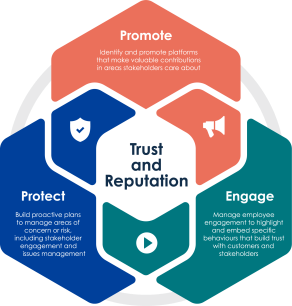Reputation has become more important – but it’s harder to manage than any other form of risk.
Reputation is about having, and conveying, a strong sense of identity. It’s about connecting with the people who matter most to your organisation, not just by what you say, but also by what you do. However, in a fast-paced world where anyone has the freedom to have their say, reputation is a huge risk that must be managed carefully.
In SenateSHJ’s Reputation Reality 2020 report, an increasing number of respondents told us that corporate reputation is harder to manage than any other form of risk. Respondents also identified that the three key factors which played the biggest role in exacerbating a crisis and wreaking untold damage on organisational and personal reputation were:
- Lack of transparency
- Lack of awareness and empathy
- Lack of speed and failure to be proactive.
We believe this is a result of a number of factors, including the rapid pace of change, increased regulatory scrutiny, customer activism, the sophistication of how customers use social media to raise complaints, pressure on organisations to focus on culture and profits not merely returns for shareholders, and the demands on listed companies by institutional investors relating to environmental, social and governance issues.
SenateSHJ helps leaders think about how they promote their business, how they protect it from risks, and how the organisation engages all its stakeholders. Our work is evidence based. We learn from investing in research in reputation management in New Zealand and Australia; with our seventh Reputation Reality report looking into leaders’ attitudes towards corporate reputation being published earlier this year. We have a strong reputation management framework that holds the trust and reputation of key stakeholders at the heart of our work.
SenateSHJ's Reputation Management framework:
